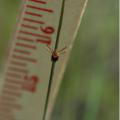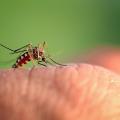Insects
Insects directly affect the lives of all Mississippi citizens. You don’t have to be a farmer or gardener to be plagued by insects. Fire ants and mosquitoes are just two examples of insect pests that affect us all.
Every major row crop grown in the state is subject to attack by a variety of insect pests, and farmers often suffer large yield losses to insects despite spending a significant portion of their crop production budget on insect control.
Commercial fruit and vegetable crops are similarly affected, and home vegetable gardeners are well-aware that insects are a constant threat to tomatoes and other home vegetables.
Ornamental plants and turfgrass are also subject to attack by a variety of insects: azalea lace bugs damage azaleas in home and commercial landscapes, crape myrtle bark scale is a serious new pest of crape myrtles, and chinch bugs damage St. Augustine lawns.
Insects, like mosquitoes and ticks, bite people and sometimes spread serious diseases, while insects like fleas plague our pets, and horn flies and other livestock pests feed on livestock, reducing growth rates and feed use efficiency.
Termites and a few other insects even eat our homes, while insect pests such as confused flour beetles and cloths moths damage food and clothing stored inside our homes.
Successful insect control requires proactive planning, proper pest identification, understanding pest biology, and a sound knowledge of control options and how and when to apply control. Insecticides are useful tools for controlling insect pests, but insecticides are only one of many methods of insect management. Plant selection, variety selection, time of planting, cultural practices, natural biological control, and exclusion are just a few examples of non-insecticidal methods that can help reduce the need for insecticide use. When insecticides are needed, knowing which insecticide to use and how to apply it safely is critical to obtaining effective control for minimum cost and effort.
These web pages and the publications they reference can help you learn more about the insect pests that affect you, your home and landscape, or the crops you produce, and they provide specific recommendations on how to control these pests.
Publications
News
As warmer weather lures us outside for yardwork, hiking, and family picnics, it’s important to stay alert for ticks.As warmer weather lures us outside for yardwork, hiking, and family picnics, it’s important to stay alert for ticks.As warmer weather lures us outside for yardwork, hiking, and family picnics, it’s important to stay alert for ticks.
Itch, itch. Scratch, scratch! Mosquito season is alive and well here in Mississippi. These insects are most active when the temperatures are above 50°F, meaning they’re here in the South for a good chunk of the year.
PICAYUNE, Miss. -- Photographers from Mississippi and across the globe can display their talent in a photo competition that introduces Bugfest 2025 – BeetleMania! The competition kicks off The Crosby Arboretum’s 23rd annual September celebration of insects and arthropods and their ecological value. This year’s fest will highlight beetles.
Success Stories
Edna Ruth Morgan’s family never would have guessed her chosen career would have been in entomology.
When most people think of mosquito control, they envision a large chemical tank in the bed of a pickup truck.
Spraying chemicals is actually the last resort in integrated pest management (IPM), a scientific process of preventing invasive insects from reaching adulthood. IPM uses environmentally responsible alternatives, such as habitat removal, structural barriers, and larval control, before using sampling and resistance management to determine treatment plans for adult mosquitoes.
A dream of the Mississippi Pest Control Association and the Mississippi State University Extension Service is coming true after more than 20 years, thanks to a generous donation by one of Mississippi’s oldest pest-control companies.







